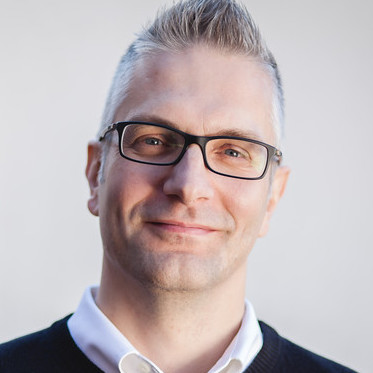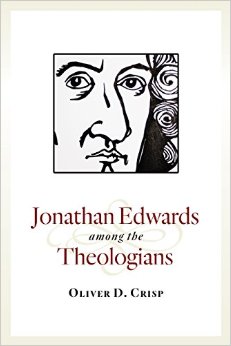Today, EdwardsStudies.com had the opportunity to chat with Oliver Crisp, one of the most productive Edwards Scholars on the global scene today. Not only has Dr. Crisp had several significant works about Jonathan Edwards published to great reception in recent years, but his new work, Edwards Among the Theologians is also being received with accolades as well.
First question: What the heck happened to the beard? A couple years ago you were rocking the manly mug, now you look like a freshman again. What gives?
The beard comes and goes. A friend said to me recently, “Well, you can always grow it back!” I guess that’s true. Watch this space …

When I read your book Jonathan Edwards on God and Creation last year, I didn’t notice the accent. But when I listened to a talk you gave recently, I could tell you weren’t from Brooklyn. Give us two-cents worth of your back story.
I was born and raised in London, England. Went to Art School in London. Then went to study Divinity (Theology) in Scotland. Taught high school for a bit, got a ThM in Divinity also from Scotland. Became a trainee minister for three years. Wrote a PhD at King’s College, London. Then taught at the University of St Andrews for a couple of years before doing a Postdoc at the University of Notre Dame. After that we relocated to the West of England, where I taught at the University of Bristol. We had a year at the Center of Theological Inquiry, Princeton. Then, after a brief stint back in Bristol, we moved out to California to teach at Fuller Seminary, which is where I am now. I’m also about to start teaching a bit for the new Institute for Analytic and Exegetical Theology at the University of St Andrews.
How did you get hooked on Edwards?
Two sources: the first was John Piper’s Desiring God. The second was a pastor friend of mine who gave me a biography of Edwards to read as I went up to University as an undergraduate. It left me fascinated. As a consequence, I decided to read Edwards on the Will as an undergraduate. Then things really got out of hand and I ended up writing a PhD dissertation on him. The rest you know.
So what’s the deal: is Edwards a panentheist or a full-blown pantheist? Has the needle moved on your position?
No, I haven’t changed my view. I think Edwards is committed to panentheism (all-in-god-ism). I argued that in my book Jonathan Edwards on God and Creation (OUP, 2012), and others have said something similar. But I now think that there are tendencies within Edwards’s thought that press him in the direction of pantheism (all is god). He would never have embraced that, of course. But there are things he does say that seem to lead to that conclusion–and this was the conclusion that Charles Hodge came to in the nineteenth century as well. So I guess I think that there is more than one Edwards, depending on how you weight certain claims that he makes in his works.
What is the new ground you are covering in Jonathan Edwards Among the Theologians. Any new or fresh insights since your previous works came out?

You’ve just named one: the pantheism question. That is a pretty big change for me. Another: my views on his doctrine of the Trinity changed since my previous book. I read Kyle Strobel’s book on Jonathan Edwards and it made me rethink my own position. Although I don’t end up agreeing with Kyle, I think his interpretation makes a lot of sense and was the means by which I came to see something about Edwards’s account of the Trinity that I hadn’t seen before. I now think that Edwards presents a truly novel model of the Trinity–a very rare thing indeed.
In addition to these, the chapter on Edwards’s preaching is something I’ve not put in a monograph before. Also, putting Edwards in “dialogue” with other classical Christian thinkers enabled me to show how his views are often not quite what you’d expect. For instance, he turns out to have a much less straightforwardly orthodox account of creation than Arminius–not a conclusion some people will be expecting!
What are some of the primary sources you are digging through in Edwards Among the Theologians?
The major works of Edwards such as Freedom of the Will; God’s End in Creation; and Original Sin. Also, his Discourse on the Trinity, and his notebooks, as well as some of his sermons.
Your last chapter is on the orthodoxy of Edwards. Give us a hint as to where you land on that.
I think that, from a certain point of view, Edwards’s views press at the very boundaries of what most Christians will consider theologically orthodox. In the final chapter, I go into that in some detail, arguing (in keeping with Charle Hodge) that Edwards’s views press him beyond panentheism towards pantheism. Those who have read Edwards’s sermons and some of his more devotional works may be a bit shocked to read this, but it is nothing more than drawing out issues that are latent in his work. Edwards was a strikingly original thinker. Sometimes his originality gets him into trouble.
What are you working on right now? Any new projects?
I’m finishing up an Introduction to Jonathan Edwards co-written with Kyle Strobel. This should be going to Eerdmans for publication in the next couple of years. I’m also currently writing a book on the atonement for Baker Academic, entitled Substitution and Atonement.
Shout outs or recommendations?
Read Edwards. His works are available online via the Yale Jonathan Edwards site. Read his God’s End in Creation, and his Religious Affections. Then read some of the harder material. As to secondary sources: read Kyle Strobel’s book; read Douglas Sweeney’s recent work Edwards the Exegete, which is terrific; and, as a good work of reference, Michael McClymond and Gerald McDermott’s The Theology of Jonathan Edwards is a significant contribution. Finally, read George Marsden’s biography of Edwards. You won’t regret it.
One thought on “Interview: Oliver Crisp on “Jonathan Edwards Among the Theologians””